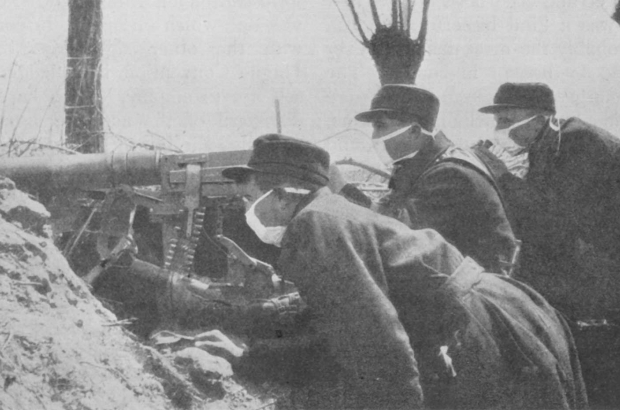- Daily & Weekly newsletters
- Buy & download The Bulletin
- Comment on our articles
One hundred year anniversary of world’s first gas attack commemorated
Flanders’ minister-president Geert Bourgeois is in Ypres today for the commemoration of an event that turned the course of the First World War exactly 100 years ago: the first large-scale poison gas attack.
The attack took place on 22 April 1915, with about 170 tonnes of chlorine gas sent drifting over the trenches between Langemark and Steenstrate in West Flanders, then occupied by French and Algerian troops. The attack claimed 6,000 lives, most of them within the first 10 minutes, and marked the start of what is now known as the Second Battle of Ypres, which would go on until late May, and include another five chemical attacks.
The gas cylinders had been brought to the front line by hand, the German troops opening them by hand and relying on the prevailing wind to carry the gas to its destination. Many Germans were also injured or killed during the attack.
“The 22nd of April 1915 saw the first use of weapons of mass destruction in the history of mankind,” Bourgeois said in a statement. “One hundred years after these gruesome events, similar weapons are still being deployed on the battlefield. Just recently, chemical weapons were used in the Syrian civil war, killing large numbers of citizens.”
Commemorating all victims
Today’s ceremony commemorates not only the victims of those first attacks, but all those who have died since as a result of the use of weapons of mass destruction. Bourgeois also called on the international community to comply with the Chemical Weapons Convention from 1993, which imposes a worldwide ban.
In related news, members of five parties in the Flemish parliament have agreed to co-sponsor a proposal to rid the country of all stored nuclear weapons. Authors of the proposal, Wouter Van Besien (Groen) and Wilfried Vandaele (N-VA), are asking the government of Flanders to pressure the federal government to dispose of the nuclear weapons that have been stored on the Kleine Brogel military base in Limburg for 60 years.
"If you want to help in the struggle to achieve a nuclear weapon-free world, you have to set a good example,” said Van Biesen.
“The commemoration of the First World War’s first use of poison gas,” said Vandaele, “is the perfect moment to call for a worldwide ban on weapons of mass destruction”.
The Flemish parliament is expected to approve the proposal today.
Photo: Belgian troops wearing makeshift gas masks at the Ypres Salient in 1915



















